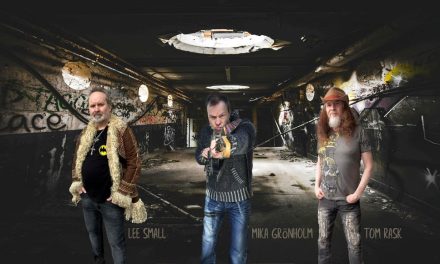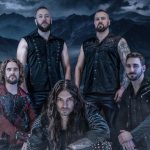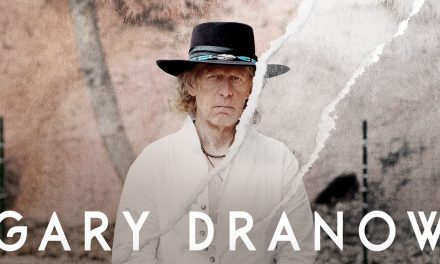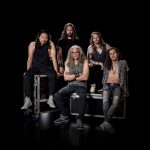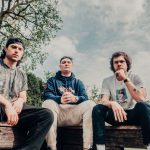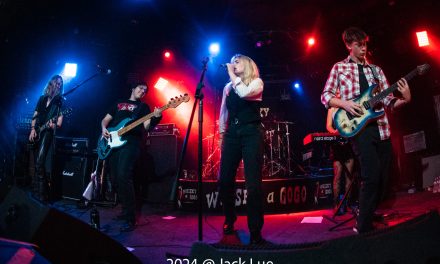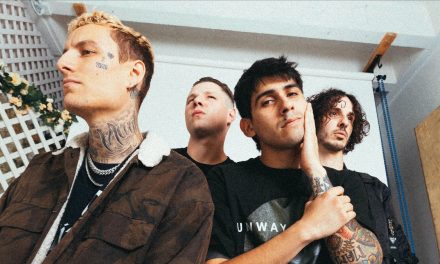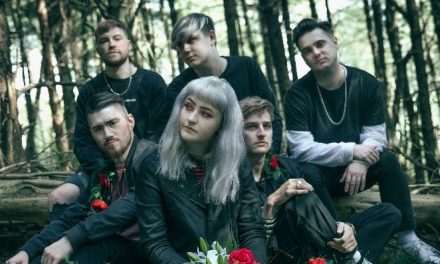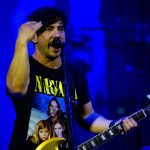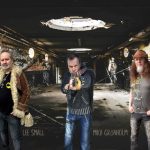
The Cycles of Metal with Angra
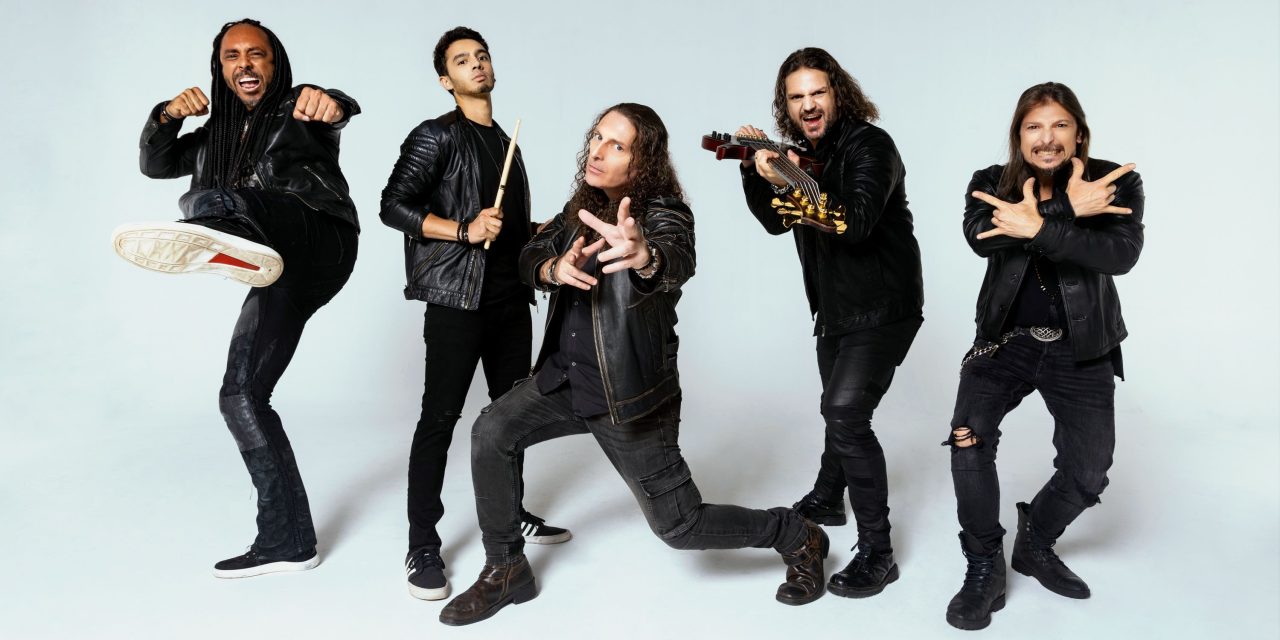

Photo Credit: Marcos Hermes
The Cycles of Metal with Angra
Angra’s metal journey began over thirty years ago in 1991. Hailing since then as one of the finest metal acts originating from South America, the last decade saw the addition of vocalist Fabio Lione (Athena XIX, ex-Rhapsody Of Fire, ex-Vision Divine) to their ranks. With Rafael Bittencourt and Marcelo Barbosa on guitars, Felipe Andreoli on bass, and Bruno Valverde on drums, Angra has been keeping the momentum and recently issued their long-awaited tenth studio album entitled Cycles Of Pain via Atomic Fire Records.
Highwire Daze recently caught up with Rafael and Felipe of Angra to discuss the Cycles Of Pain magnum opus, working with other bands and artists such as Amanda Somerville and Sons of Apollo, their work together on The Bittencourt Project, and more. Read on…
First of all, let’s talk about the new album, Cycles Of Pain. Is there any overall story or concept behind that title?
Rafael Bittencourt (guitars): Well, the album is not only about pain itself, it’s more about the cycles than about pain. It’s about how we need to endure challenges, difficulties in life just to grow and to get stronger, basically. We did come up with this idea beforehand. It was just like a consequence of contended emotions because of not writing songs and not being together as a band for so many years. Then when we were finishing the album and the lyrics were written, we could see this common thread between the songs that hurt and pain was always there. But also, a very positive perspective of it, of how funny it is that we avoid pain but in life we look for pleasure and for happiness. But in the very end, pain is what shapes us into what we end up to be. It was like a conclusion. The title of the album is also the conclusion of all the songs.
How much did the pandemic affect the new album, if at all?
Felipe Andreoli (bass): It affected the album in quite a few ways. The first one is that it delayed the process a lot because we live far from each other. We have Fabio living in Italy, we have Bruno living in the US, and even inside Brazil, Marcelo lives in Brasilia, which is like 1,500 kilometers from where Rafa and I are. Yeah, that played a part, so we ended up only meeting to write music for real after the pandemic was practically over. But talking about the concept, the theme of pain, of course, the pandemic was a big pain for mankind. So many lives lost, so many people locked in their homes, so many business failings, so many people without a job. Yeah, talk about pain, right? There was no way that this wasn’t going to influence the direction of the lyrics one way or another.
Because we don’t really like to write about fantasy. We always talk about reality, even though many times in a more poetic or metaphoric view of reality. But the pandemic is really one of the many kinds of pains one can endure in their lives, and personally, we were and are going through personal pains in our families, in our daily lives. The lyrics are very true to what we’re going through in our lives, and I think anyone can relate because pain is unavoidable. And it’s dealing with pain and how you come out of it, that’s the key to growth, in my opinion.
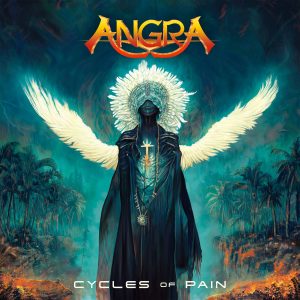
Rafael: Well, most of all, I think with our chemistry, we’re talking a lot about pain. But it was a surprise for me to see that pain was so much there because the original inspiration that I’ve noticed when we started to write the songs was the excitement of being together again. The excitement of regaining this energy that we have together. The happiness of just being with our friends and making music. Everyone was thrilled of, “Okay, let’s write an album. Excited, let’s make it the best album ever.” This was the basic energy, and it’s funny that pain was so much there in the lyrics. But because it was, as I said, a very contented emotion, and Dennis, he noticed and contributed a lot to that excitement.
Dennis has been a band member for his whole life, so he likes that, the joy of sitting down and having a pizza after we’ve worked for the whole day. I think Dennis has contributed a lot, not only by the great engineering producer he is, but by the good band member he is. He’s always contributing to a good state of mind and mood for everything to go well.
This year marks the 10-year anniversary of having Fabio of Rhapsody in the band. What has it been like working with him for 10 years and can you believe it’s already been 10 years?
Felipe: Yeah, time flies. It all started in a weird way because Fabio came in to fill a spot of the singer we didn’t have, and he ended up being such a great, not only a great singer, but a great company and a great friend that we just went with it. When we realized he was part of the band, we never made an official announcement, there was no bells and whistles. He just did the great work and we kept working. Even now, 10 years later, we’re all shocked by how great he is, and I think Cycles Of Pain is for sure his best work with Angra, and in my opinion, one of the best works he ever recorded with any band.
Part of that is that he feels now much more comfortable to contribute and to impose the way he wants to sing and his style of singing. He has such an elastic voice that can do basically anything, and he did basically everything in the album from the highest highs to the lowest lows and the aggressive voice. And the way he interprets the songs and the lyrics, so we were all in awe. And Dennis was really pleased working with Fabio because he was so fast and so good. It’s not every day that you record a singer so talented like Fabio.
One of the guests that you have on your album is Amanda Somerville. Tell me what it was like working with Amanda and how did Amanda become involved?
Rafael: It was a great surprise for us. I didn’t know Amanda. She’s a friend of Fabio. The thing is that we have always wanted to have Fabio singing with his operatic technique. He has a very accurate Bel Canto tenor technique for singing. I have always wanted to write a song. We tried to have him sing in the metal song that way. It never sounded too fine. So I wanted to write a song that could fit, and I wanted that to be a duet with another singer. And he suggested Amanda for the job because he said she’s cool and she’s a great singer. We didn’t know that much about her until she sent all the tracks, which was already impressive. Then like a month afterwards, we had a chance to record, to shoot a live version of that song here in Brazil.
Actually, we’ve done an acoustic version of that song, Tears of Blood. She flew all the way from Germany. She told us that she hadn’t sung live since before the pandemic, like for 3 or 4 years. So, she was also thrilled of being with us. It was a fun moment to be with her. She’s a great person. She was friends of Andre Matos too, so she told me many stories about having Andre at her place, singing together with him. So we very fast became friends, and now we can say that Amanda is part of Angra’s family.
You just mentioned Andre, who passed away in 2019. How did his passing affect the writing of the band?
Rafael: Well, it was not specific his passing that affected, but a bunch of things that happened together with this. Right when we finished touring with Omni, we were so excited. It was one of the longest and funniest tours we’ve ever done. Omni has been very successful. We wanted to write another album. We were very motivated as a band, and then Andre passed away. And a few months later came the pandemic. Then a lot of other personal stuff that happened to all of us in the band. Yeah, Andre is part of the hurt, is part of the list of scars that we’re still waiting to heal, and it’s there. It’s not in a specific way, but on the way we see life, the way we see death, the way we see how important it is to be with your friends, to build something, but also to live life with light moments. Not only being concerned about work, about survival, about paying your bills. It’s important to find a balance between giving value to simple moments, and also making it worth. Making something that is meaningful also for other people. I think it’s like in a notion of deep thoughts that were boiling for the past few years.
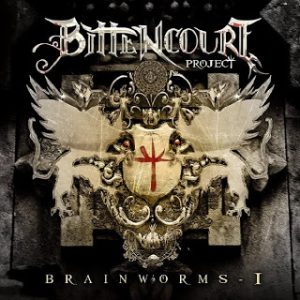
Rafael: All right, thanks for asking. Well, yes, it differs a lot because it’s more like a personal statement. It’s about my childhood. I have always wanted to write an album, very personal, like writing about personal stuff where I grew when I was young, who were these characters, these people around me that I remember, places, feelings. It was born like this, but obviously nowadays I see it different. If I was going to pick it back up, it would be completely different. But, at the time, it was very important for me to have some declarations about myself. I’m very happy that Felipe took part of it too.
Felipe, do you have any comments about The Bittencourt Project and doing that outside of Angra?
Felipe: Yeah, it was pretty cool to take part. I recorded half the album on bass, and I did quite a few shows with Rafa, and I love the album. I love the songs, and I think it’s great to hear Rafa outside of Angra exploring other styles and his own personal style of writing music, and was a blast to play with him, for sure.
Felipe, according to Metallum, another one of your projects was Sons of Apollo. What did you do in that band and what was that experience like?
Felipe: Yeah, that was a crazy one. I’m friends with Jeff Scott Soto, and they had a tour booked in Brazil that had to be postponed twice because of the pandemic. When finally they booked the shows, Billy Sheehan wasn’t able to make it to Brazil, so they called me. Jeff told me, “You are the man to do it. If Billy can’t do it, you’re the only one to do it.” Yeah, so we did it and it was a surreal, amazing experience. We played 6 shows in South America and a festival in Armenia, which was crazy. I played with my heroes, especially, Mike Portnoy and Derek Sherinian and Bumblefoot, and of course, Jeff Scott Soto, which despite being a friend, I’m also a big fan of since the early days. So that was really cool, and to replace Billy Sheehan, one of my greatest bass heroes, is just surreal to me.
That must have been nerve-racking too.
Felipe: I got to be honest, though, replacing Billy was, of course, a big responsibility and the music is really challenging. But the most nerve-racking part to me was playing with Mike Portnoy because I’ve been such a great fan of Dream Theater from an early teenage age that I had to prepare myself mentally to not break down in tears when we played the first note together.
What was it like working with Doro Pesch?
Rafael: Well, for me, it was like working with a legend because when I was young, I’ve been around for a while, but I think she started a little bit before me, and we didn’t have that many girls as Metal singers at the time. So, it was always nice to see a girl as a Metal singer. And then we had a chance to play together with her on this festival, Rock in Rio, here in Brazil. Then we really got to meet her and she was so nice. She’s one of the pioneers for the female Metal singers.
We were mentioning that Fabio has been in the band for 10 years. You also have another anniversary that just came up this year, the 30th anniversary of Angels Cry. When you look back at that album, what do you think of it now in retrospect and the fact that it’s been 30 years?
Rafael: Well, it’s really funny to look back and see that it’s been 30 years because it seems like it’s been yesterday. But, although, when I recall everything we’ve been through, I know it’s a lot. To me, it’s more than recalling about the album, but knowing the positive feeling that we’re still here. We have an album that is, for my taste, so great as Angels Cry. We’re still creative, we’re still productive, we’re still excited. So this is the most important fact about it that I can recall it. I see where was the beginning, all the naïve motivations that we had at the time. But it’s even more fantastic that we’re still here. So many things try to disappoint us, try to make us give up, but we are still here, stubborn Metal dudes that want to insist that people should listen to our music.
Does Angra have any plans of touring the states in support of Cycle Of Pain, or is that something you’d like to do?
Felipe: We would love to. We did a very extensive tour supporting Omni on the US, and we would love to repeat it. We do have 2 shows booked in the US. One is, of course, the 70000 Rons of Metal in January, and then the ProgPower Festival in Atlanta in September. But we don’t have plans for a full-blown tour yet. We’re working on it and seeing possibilities to come back. We’re considering maybe doing a smaller tour with key cities and key places. But, yes, definitely stay tuned because we’re working on it.
Do you have any messages for your fans here in the United States and in Los Angeles who are reading this now?
Rafael: Well, I want to say that I miss America a lot. That I’d love to visit again, to tour with Angra. America is a very special place because many of our references, musical references, came and still come from America. We have this special feeling toward the crowd, American crowds, the American culture, in general. So I want to say that I wish I can see you guys anytime soon on tour.
Felipe: Yeah, and talking about Los Angeles, specifically, we did a great show at the Whisky, legendary place. It was a dream come true to play there, so I look forward to playing in Los Angeles again soon.
(Interview by Ken Morton)
Angra on Instagram

